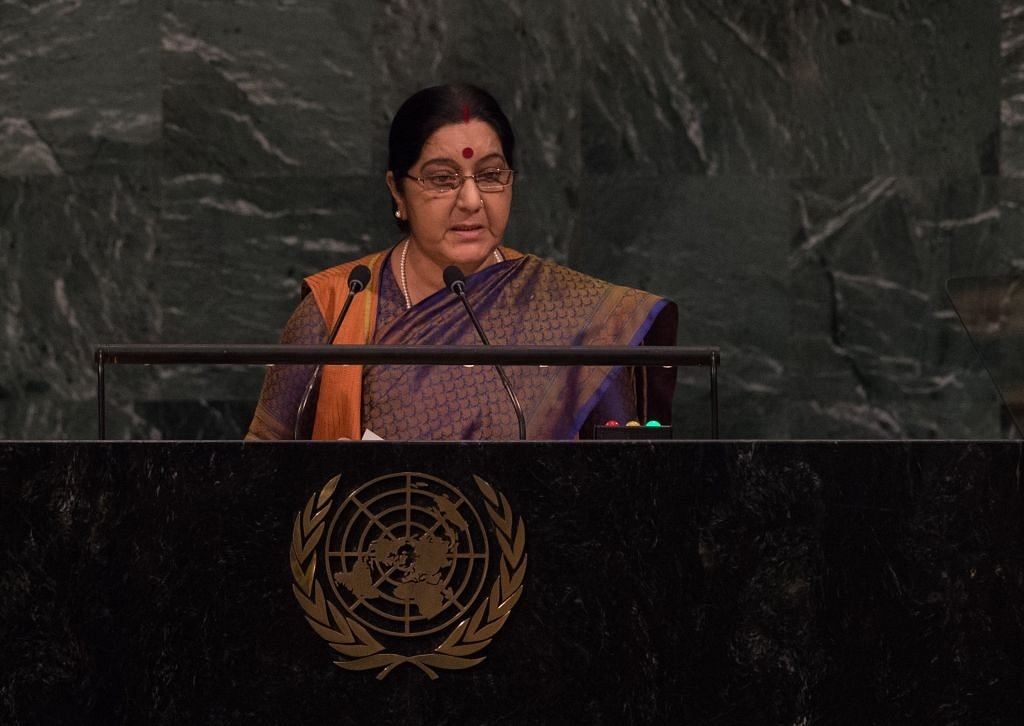World
Sushma Swaraj At UNGA: A Nation Speaks
- By questioning the secular credentials of Jinnah, Swaraj not only robbed the Pakistani establishment of their moral fig leaf but highlighted the basis of a starkly contrasting present of two countries born at the same time.

India External Affairs Minister Sushma Swaraj addresses the 72nd Session of the United Nations General Assembly at the UN headquarters in New York on 23 September 2017. (BRYAN R SMITH/AFP/GettyImages)
There are some speeches by political leaders which are significant for the brilliant articulation of topically relevant issues, some for charting a new course and yet others where a nation finds an expression in the leader voicing them. Sushma Swaraj’s speech at United Nations General Assembly (UNGA) in New York yesterday was all of it rolled into one. Speaking on the topic “Focusing on People: Striving for Peace and a Decent Life for All on a Sustainable Planet”, the External Affairs Minister of India enumerated the various measures undertaken by incumbent government for poverty alleviation.
Recounting specific schemes and precise numbers which have benefited from these measures so far, Swaraj representing the government of one fifth of the humanity at the UNGA session spoke of the national commitment towards empowerment of poor. In her momentous address, Swaraj touched upon all the major global issues from spread of terrorism to climate change, forced immigration to cyber security and poverty and hunger to women empowerment. The outstanding feature of her speech – both while mentioning the initiatives and identifying the challenges – however, was a culturally Indian response.
Sharp and sardonic, Swaraj dug into a uniquely Indian phraseology to make her case and put the sub continental conflict in its true perspective by rooting the speech in a civilisational narrative. By questioning the secular credentials of Pakistan’s founding father Mohammad Ali Jinnah, the External Affairs Minister not only robbed the Pakistani establishment of their moral fig leaf but highlighted the basis of a starkly contrasting present of two countries born at the same time. Swaraj further rubbed it in by juxtaposing an India, which perseveres to build institutes of excellence and takes global lead in information and technology as opposed to a Pakistan, which has invested only in promoting terror and creating terrorist organisations.
The import of the civilisational contrast between an Islamist Pakistan lagging behind in socio-economic parameters and posing a global threat to the world as against the benign Bharatiyata, highlighted by Swaraj underlines the nature of the persisting conflict. Surprisingly, for long, the Indian foreign policy mandarins under previous regimes had shied away from emphasising the same. Obliged, strangely by a coquettish impulse, to make Pakistan feel good, India had not just tacitly approved Jinnah as a secular icon but legitimised the relentlessly aggressive pursuits of a country permanently at war.
The lack of a truthful assertion has emboldened Pakistan to put forth a claim on Kashmir while continuing with its apparatus of state sponsored jihad. It has also allowed a country which genocides its own population and oppresses the minorities to be treated as normal. A scathing Swaraj hit the nail on its head when she responded to Pakistani Prime Minister Shahid Khaqan Abbasi’s charge of human rights violations in Kashmir with a pithy – “Look who is talking”.
The civilisational depth and succor deployed by Swaraj ends the humdrum and vacuity of quixotic tilting at the windmills. Indian foreign policy under the Narendra Modi dispensation now clearly represents the force of a nation state ready to confront its ideologically-driven foes. In doing so, it demonstrates, on one hand, its grit and determination to fight the provocations till the end and also a genuine wish for peace and well being of all – animate as well as inanimate, on the other.
Going beyond a mere rejoinder to Pakistan or an assertion of Indian diplomatic strength before the world, this speech, in line with previous pronunciations by Prime Minister Modi on various occasions, was also an attempt to engage with the people of Pakistan. It reminded Pakistanis of the choices they have made, in demanding the creation of Pakistan, persisting with an Islamist socio-politics and the consequences thereof. The Upanishadic ideal embodied in the shloka Sarve Bhavantu Sukhinah, Sarve Santu Niraamayaah, Sarve Bhadraani Pashyantu Maa kashchid Dukh Bhaagbhavet which Swaraj quoted to conclude her speech not only distinguished Indian ethos from an expansionist and exclusivist jihadi psyche, it was a pointer to the land that Pakistan, synonymous with terror and destruction now, itself once was.
Introducing ElectionsHQ + 50 Ground Reports Project
The 2024 elections might seem easy to guess, but there are some important questions that shouldn't be missed.
Do freebies still sway voters? Do people prioritise infrastructure when voting? How will Punjab vote?
The answers to these questions provide great insights into where we, as a country, are headed in the years to come.
Swarajya is starting a project with an aim to do 50 solid ground stories and a smart commentary service on WhatsApp, a one-of-a-kind. We'd love your support during this election season.
Click below to contribute.
Latest